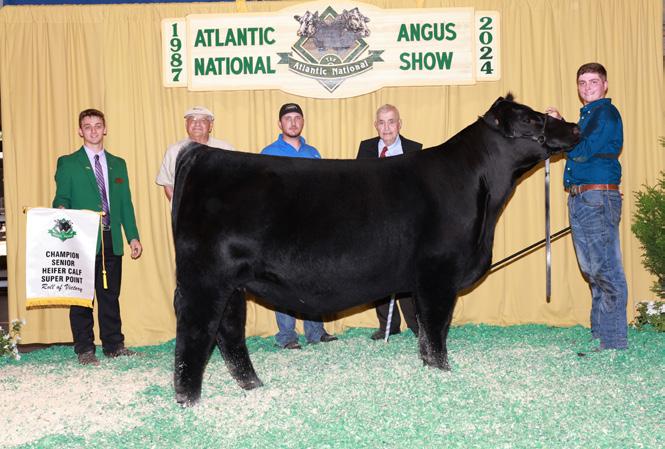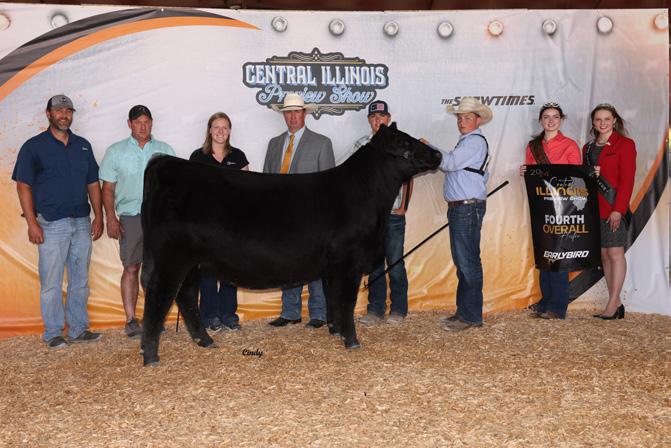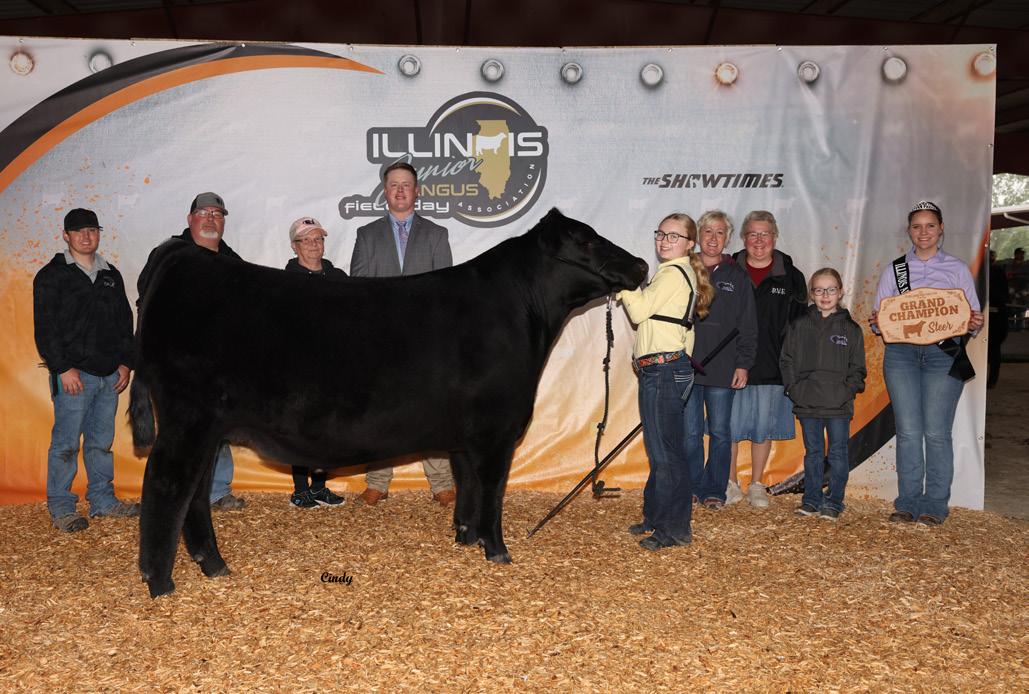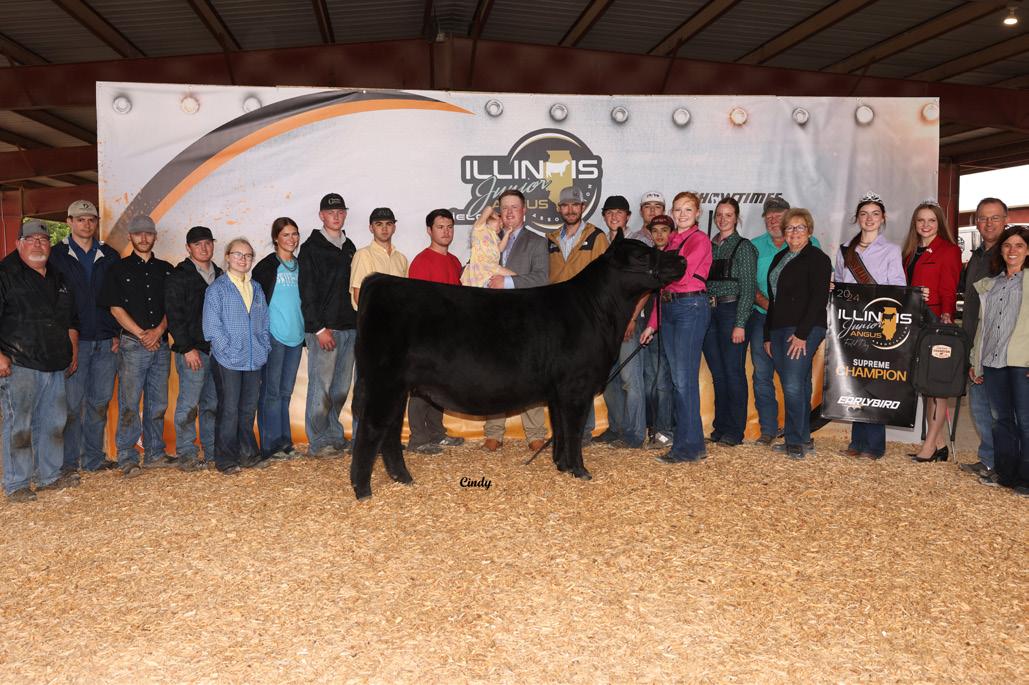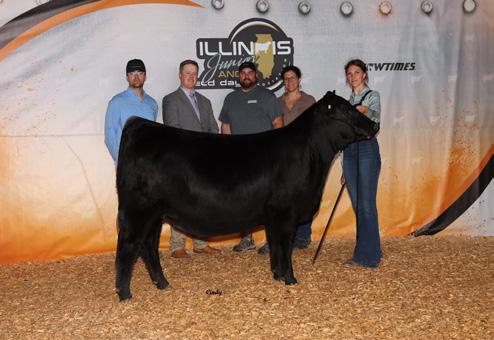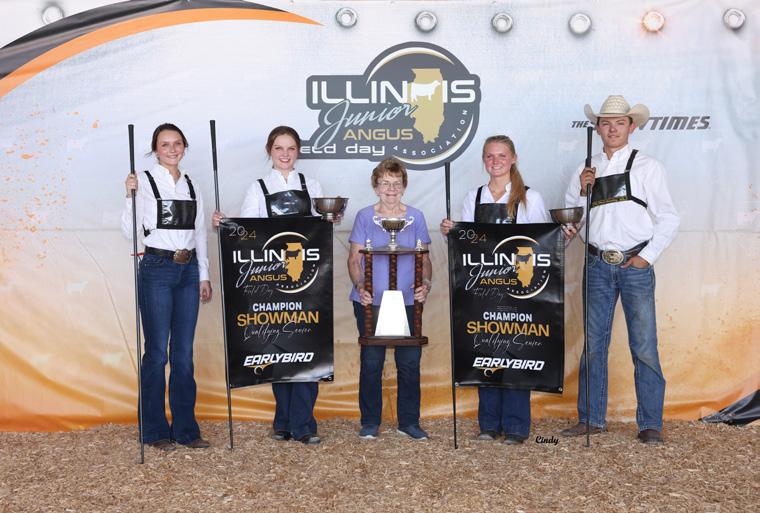July/August 2024
President: Carla Jurgenson
Vice President: David Mool
Secretary: Clay Sellmeyer
Business Manager: Doug Turner
Past President: David Jenkins
Bureau County: Vaughn Kiner
Central Illinois: Luke Lemenager
Logan County : Carla Jurgenson
Northern Illinois: Jarad Carroll
South Central: Richard Hurst
Wabash Valley: Shaye Harre
Directors at Large:
Sam Brumlevy
Brent Hinkle
TJ Curtin
Brian Hutchins
Kyle Buetke
Jeff Dameron
Chris Cassady
Clay Sellmeyer
Dan Naughton
Eric McClure
David Mool
Bodee Schlipf
Brad Evans
Tracy Rawlings
ON THE COVER
Photo taken by Devin Bollman at
Stewards of the Year Wes and Martha Green’s Diamond G Farms.
UPCOMING EVENTS
build back, we want them to build back with Angus – not necessarily because of reputation or nostalgia, but because we can provide them with the highest quality and most accurate tools for production and management in the industry today.”
For more information or to enroll cattle, call 816-383-5100, or contact AngusLinkSM via email at anguslink@angus.org. IMI Global can also be reached to help start an enrollment at 303-895-3002, or producers can complete its contact form at www.imiglobal.com/contact.
– Written by Sarah
Kocher,
Angus Communications
Show Results
2024 Atlantic National Regional Preview Junior Angus Show
Timonium, Md. | May 25 | Judge: Travis Pembrook, Okla.
Photos by Next Level Images
Reserve Grand Champion Bred and Owned Female
PVF Blackbird 3152
Owned by Adam Miller
Calf Champion
Dameron C-5 Nellie 2145
Owned by Quentin Day
Calf Champion
PVF Missie 3185
Owned by Ashtin Dillow
2024 Atlantic National Super Point Roll of Victory Angus Show
Timonium, Md. | May 26 | Judge: Andy Higgins, Auburntown, Tenn.
Photos by Next Level Images
Grand Champion Bull BNWZ Paisley 2143
Owned by Jeff Fruhling, Ill. and Austin Nowatzke, Ind.
Reserve Junior Champion Bull RGCC Making Headlines 452
Owned by Destiny Angus Farm, Ill.; Wills Angus Farm, Ill.; and Sophia Royer, Ind.
Owned Reserve Senior Heifer
Owned Reserve Senior Heifer
National Merit Scholarships Illinois Winners: Adam Miller (pictured second from left), Amelia Miller (pictured third from right)
Grand Champion Owned Female PVF Proven Queen 3025 Owned by Ashtin Dillow
Reserve Grand Champion Cow-calf Pair
Diamond T Saras Dream 0206
Owned by Morgan Hutchins
Central
Reserve Grand Champion Female
PVF SFA Missie 3067
Owned by Ashtin Dillow
Illinois & Junior Angus
Senior Heifer Calf Champion
Dameron C-5 Nellie 2145
Owned by Quentin Day
Association Preview Show
Bloomington, Ill. | May 30-June 1 | Judge: Brock May, Wis.
Photos by Cindy’s Livestock Photos
Central Illinois Grand Champion Heifer
DDA Northern Miss 2318
Owned by Max Dameron
Central Illinois 3rd Overall Heifer
CK3 Barbara K69
Owned by Cylee Kirchner
Central Illinois Reserve Grand Champion Heifer
Lemenager Proven Queen L14
Owned by Paige Lemenager
Central Illinois 4th Overall Heifer
HTF lady 2317
Owned by Brode Bergman
Central Illinois 5th Overall Heifer
PVF SFA Missie 3071
Owned by Ashton Dillow
Grand Champion Bull York Farms Knight Rider 2259 Owned by Cody York
Reserve Champion Bull BNF Atomic 2302 Owned by Claire Kuipers
Champion B & O Female PVF SFA Missie 3071
Owned by Ashtin Dillow
Res. Champ. B & O Female
Dameron Primrose 2146 Owned by Max Dameron
3rd Overall B & O Female PVF Blackbird 3152 Owned by Adam Miller
4th Overall B & O Female
Lemenager Proven Queen L14 Owned by Paige Lemenager
5th Overall B & O Female
DSM Sheza Gold Digger 954 Owned Charlotte Musser
Champion Owned Female
Dameron Northern Miss 374 Owned by Paige Lemenager
Grand Champion Steer
FSC French Fry 17L Owned by Chandler Jones
Reserve Grand Champion Steer Owned by Berklee Bedel
Res. Champ. Owned Female
DDA Northern Miss 2318
Owned Max Dameron
3rd Overall Owned Female
PVF Missie 3184
Owned by Chloe Boitnott
Champion B & O Cow-calf
DDA Northern Miss 2211
Owned by Reese Anderson
Champion Cora Craig
Res. Champion Berklee Bedel
4th Overall Owned Female
FCF WHM Phyllis 258
Owned by Anna Johnson
5th Overall Owned Female SULL Ellie 2571K
Owned by Christian Fischer
Reserve Champion Cow-calf Dameron C-5 Lucy 2242
Owned by Anne Dameron
Pee-Wee Showman
Junior Division A Showman
Champion Lydia Leake Res. Champ. Caylen Kirchner
Junior Division B Showman Champion Addison Tebbe Res. Champ. Macie Bartlow
Intermediate Showman Champ. Ella Eathington Res. Champ. Macie Carroll
Senior Division Champion Champion Chloe Boitnott Res. Champ. Ashton Dillow
H. George Sperry Mem Showmanship/ NJAS Qualifying Senior Showman
Ch Lauren Wolter, Res Reece Anderson, 3rd ALT Cody York, 4th ALT Addison Bartlow, Linda Prox the presenter
The Joseph Besler Award Kyle Eathington
IJAA Royalty
IJAA Board
The Beryl Rutledge Award Chloe Boitnott
The Troy Miller Award Paige Lemenager
Forages & Fences
IBA Environmental Stewards of the Year, Wes and Martha Green, prove that working to preserve their farm ground has lasting benefits.
By Olivia Hoots; Photos by
Zack Arnold
Grab the wire and a wrench, let’s get fencing!
Temporary fencing, reliable water sources and grass are three of the most important resources for producers who practice rotational grazing. This type of grazing is becoming more and more popular as time goes on and producers experience the benefits of it for themselves.
Wes and Martha Green of Atlanta have implemented rotational grazing and other practices into their registered Angus operation, Diamond G Farms, to maximize their resources and steward their land. These are the practices that moved their peers to nominate them for IBA Environmental Steward of the Year.
Wes still remembers his first calf at the age of eight named Sam, which he bottle-fed and showed, then sold for $365. He used his earnings to buy a registered Angus heifer from the Illinois Spotlight for $375. In 1995, when Wes’s grandfather – someone who was very influential in his life and work –passed away, he took over his 20 head of cattle, adding it to his then eight-head herd. Today, the Greens have about 60 Angus cows.
Currently, and for a long time now, they have been doing AI work for themselves and some other breeders. They first started this by crossing Simmentals and Angus for themselves, and also had some club calves when their kids were growing up. Wes is also crossing Wagyu on his Simmental cows.
While there are a few other breeds in their pasture today, the Greens focus on Angus. “I try to keep them purebred Angus so I can rebuild the herd or retain the heifers,” Wes says.
Before their farm became what it is today, Wes and Martha met at the Logan County fair, a mutual friend introduced them. During the evening with friends, Martha was in Wes’s way on his way to the bathroom, so he threw her over his shoulder, and they have been together ever since. “I was a gentleman and put her down before I went in,” he says.
Martha could tell he was a very outgoing guy who was fun to be around. Her friend convinced her they would be perfect together. “She was right,” she says.
She recalls jumping into her role as a farm wife, saying her athleticism made her ready for the new challenge of throwing bales and helping with whatever was needed. She calls herself a “right-hand man” to her husband as they use team work to make their business a success.
After thirty-eight years of marriage, the couple has three children – Adam, Amanda and Ashley – and seven grandchildren. Martha liked the idea of raising her kids on tractors and in 4-H, and still today the kids help when needed.
Paths of Environmental Stewardship and Attaining Goals
Diamond G Farms has two goals: maternal cows and freezer beef.
There are a few practices that help them reach these goals. One of them is the forage side of the business – another way the Green’s display their environmental stewardship. It started with new equipment for their farm, then people in the community started calling Wes to come do work for them. Now they do a lot of custom work and partnered with Pro
Harvest in 2007 to add seed sales to the forage business.
The Green’s forage success earned them the 2022 Outstanding Producer Award through the Illinois Forage and Grasslands Coalition.
Wes says it keeps their forage customers from having to source seed. “And it is a good quality seed as well.”
Betsy Pech has known the Green’s for at least 25 years. She says that alongside their successful hay business is their cattle
operation. “They utilize rotational grazing not only for the cows but to protect and keep the soil healthy,” she says. “Wes and Martha also make use of different types of forages so the cows can graze almost all year, providing biodiversity to the soils.”
To Wes, being an environmental steward means leaving land better than when it first became yours. This is where his second stewardship practice plays an important role.
Take a look at the paddock the herd is currently grazing.
Wes describes his soil and grass stewardship practices.
Temporary and high tensile fencing are the necessary tools for rotational grazing.
Wes and Martha demonstrate how they rotate the herd.
Always checking the weather, of course!
Wes and Martha’s replacement heifers.
“That is what I am trying to do by incorporating cover crops.” His overall goal is to build soil health.
Thirdly, rotating the grazing of their herd also helps with soil and plant health, and promotes overall economical sustainability too. “Two and a half days is ideal,” Wes says.
This started in 2005 when they began expanding their herd and participated in the Environmental Quality Incentives Program.
“We got the EQIP grant, did the whole perimeter and five strand high tensile,” he says. “Each paddock is subdivided with two strands, or one strand of high tensile.
In their rotational grazing, they mostly use the cattle to manage weed infestation, and they prioritize a water source in each of the 21 individual paddocks, whether it be a hydrant and tank or something else.
“If you are not using rotational grazing right now, I think you are missing out on a lot of benefits, because your animals are going to graze that one spot, find that sweet spot, and just keep after it,” Wes says. “With the rotational grazing, you can kind of make them eat and utilize all of the ground a lot better.” They do soil testing to prove the success of rotational grazing on their soil’s health.
Martha sees other farmers feeding hay before they have to because of their rotational practices. She could sing the praises of the effectiveness these practices have had on their soil’s health and fertility. “You can see from year to year how much better it is.”
Beyond the farm, Wes is also a road commissioner for the Atlanta Township, and served in the U.S. Marines, and is also involved in 4-H and Heartland Beef Association. He enjoys helping others in whatever capacity. Martha was a 4-H leader for 25 years and also taught Sunday School, she often helps her husband with road commissioner work.
In being recognized as IBA Environmental Steward of the Year, Wes says, “I guess that shows that we are doing what we are supposed to be doing with our soil health and everything pertaining to the animals.”
“God only gave you one world to live in, and if you’re not taking care of it, nobody else is,” Martha says.
“What I am most proud of is, Wes and I started with nothing, and we have built,” she says. “We have worked our rear ends off.”












